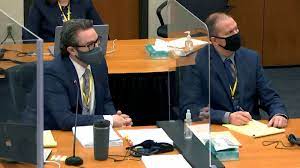Ashley Kim ‘23
Following months of Black Lives Matter protests, communities nationwide celebrated the long-awaited guilty verdict of Derek Chauvin. On April 20th, 2021, Chauvin was convicted on all three counts of second-degree unintentional murder, third-degree murder, and second-degree manslaughter for the killing of George Floyd in May of 2020.

Photo courtesy of ABC News.
Suspicious of the use of a counterfeit $20 bill, Chauvin, a white cop with the Minneapolis Police Department, arrested Floyd, a 46-year-old black man. Following the arrest, Chauvin knelt on Floyd’s neck for 9 minutes and 29 seconds while he was lying facedown on the ground. Three other police officers were involved in restraining Floyd and preventing bystander intervention. The video of Floyd’s murder, caught by onlookers at the scene, went viral online and fueled the momentum of the Black Lives Matter movement.
To some, the verdict seemed inevitable. Clare Collins ‘23 says, “I speak for my whole family when I say we were all awaiting the verdict of this trial, […] we all thought ‘it’s about time.’” Anika Agarwal ‘23 adds that she was relieved when “[Chauvin] was found guilty on all three charges because the evidence was so overwhelming.” Similarly, Father Tim Gavin, Head School Chaplain, shares, “It would have been disruptive to the peace of the country if the outcome of the trial was different.”
Over the summer, millions of people flooded into the streets to condemn police brutality following Floyd’s death. These Black Lives Matter protests played a significant role in Chauvin’s verdict. People standing against the injustice of Floyd’s murder included those dissatisfied with the handling of the murders of Breonna Taylor, Ahmaud Arbery, and more.
Collins says, “Our police system is so corrupt that we know there wouldn’t have been a trial for the murder of George Floyd if it weren’t for the countless protests that occurred over the past year.” She also explains that with Derek Chauvin’s arrest in particular, “we know that our protests worked.”
Another important factor in Chauvin’s verdict was the distressing video of Floyd’s murder, which served as indisputable legal evidence in the trial. However, Agarwal points out that the video also shows a weakness in the accountability of our justice system. She elaborates, “It worries me that he might have been acquitted if there wasn’t video footage that the entire world had seen.”
While videos have played a major role in demanding accountability in recent years, a long history of police brutality in the United States has not been recorded. James Finegan, Middle and Upper School Orchestra Director, notes, “It’s not more police brutality now, it’s more documentation.”
While much of the community has expressed relief in Chauvin’s punishment for Floyd’s murder, not everyone is satisfied. “Justice will never be served as a man lost his life, and he can never be brought back,” says Ayinde Tate, the Head of Diversity, Equity, and Inclusion at EA. “The hope is that this case shows the general public that people who are sworn to protect a community should be held to the same standards as an average citizen.”
Reemphasizing that Floyd’s case is not the first of its kind, Agarwal hopes that “this trial sets a precedent for police to be held accountable and make better choices knowing that there will be consequences.” Tate believes that with acknowledgment and empathy, we can work towards healing in our communities. “As a society, we can’t be content with the outcome of this case,” he says, “We need to continue to hold people who kill people unjustly accountable.” Gavin agrees, “We need more compassion for one another. I hope we can heal.”
The healing process also requires the cooperation of the police force. Finegan, whose brother works in law enforcement, emphasizes the importance of respectful discussion and openness towards different points of view, remarking, “I felt very strongly that Floyd’s murder was wrong, and in this case, it was clear to my brother and his colleagues that Chauvin should be convicted. This was refreshing coming from the law enforcement community, but there also needs to be changes in how policing is done in order to avoid another instance like this one.”